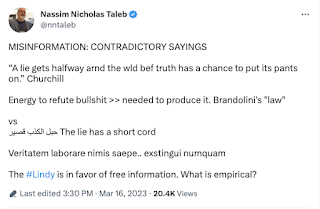Some Proverbs on Truth and Lies
Yesterday, Nassim Taleb posted this tweet, observing a contradiction in some well-known sayings about lies being fast to spread/hard to refute on the one hand, and on the other hand limited.
In Armenian popular aphorisms there does not seem to be a contradiction between these notions. All proverbs on lies that I could find are of the latter type, emphasizing their limits, and that the one who tends to spread lies will (sooner or later) pay the price for it:
Սուտը ոտք կ’ելլէ, ամա չերթար։
[The lie stands up but does not walk.]
Ստի ոտները կարճ են։
[Lies have short legs.]
Սուտը սուտ ասողի տունն է քանդում։
[The lie destroys the home of a liar.]
But the key is to also look at proverbs on truth, which emphasize that
(i) those who speak the truth tend, at minimum, not to have a[n earthly] master:
Շիտակ ըսողը տէր չունի։
[The truth-teller has no master.]
(ii) must have balls (or, as this aphorist put it, must be at least a little foolish for voluntarily putting oneself in harm’s way):
Դուզ խօսողի գլուխը ծակ ա։
[The truth-teller has a hole in his head.]
and/or have an escape route prepared:
Դրուստ ըսողին մի ձի, որ ասի ու փախչի։
[A horse for the truth-teller, so he can speak and get away.]
(iii) the audience is not always ready to accept the truth:
Ճշմարտութիւնը միշտ ընդունելի չէ։
[Truth is not always welcome.]
In part, perhaps, because (iv):
Շիտակ խօսքը կատակով կ’ըսեն։
[The truth is said jokingly.]
Therefore, (v) we arrive at the resolution in the following proverb:
Մինչեւ ղորդը գայ, սուտը աշխարհ կ'ուտէ։
[By the time the truth is revealed, the lie is already feeding on the world.]
As we are dealing here in the rational domain, as I see it, another problem with lies is that, in our urge to dispel them, we often replace one lie with another, more plausible sounding lie, as in a heated argument—a problem that is exacerbated by the speed of interaction and desire for engagement on social media, where it is less painful to be wrong than to be ignored.



Comments
Post a Comment